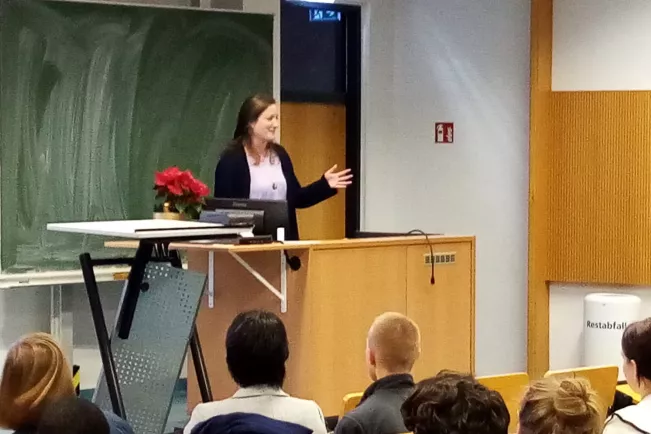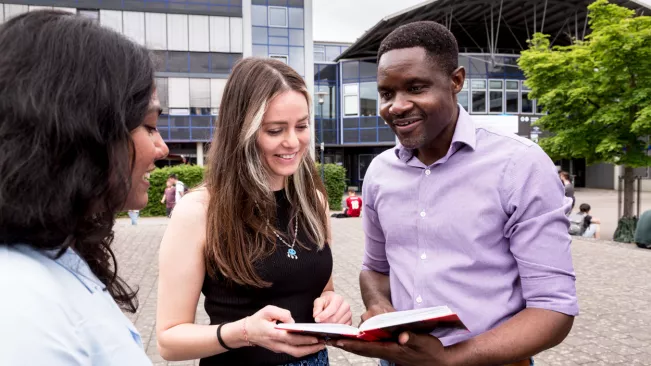International Centre for Sustainable Development (IZNE)
New impulses for sustainability: Professor Helmsmüller joins the Directorate of the IZNE

IZNE: Welcome Professor Helmsmüller and congratulations on your new position at IZNE!
Simona Helmsmüller: Thank you, I'm delighted to be here.
IZNE: You will be taking on the role of a member of the directorate at the International Centre for Sustainable Development (IZNE) this winter semester. How did this come about and what made you decide to take on this position?
Helmsmüller: I have been following the work of the IZNE for a long time, as I teach and research in the field of social protection in the Global South, so I travel internationally and deal with sustainability issues, especially social and economic sustainability. Since the winter semester of 2023, I have been funded by the PeP@H-BRS project as a priority professor in the field of sustainable social policy, which has given me more freedom for my research. The IZNE's offer to join the directorate came at just the right time.
IZNE: You have been teaching in the Department of Social Policy and Social Security at H-BRS for several years. What topics exactly do you deal with in this area?
Simona Helmsmüller: For example, I'm looking at health insurance in Pakistan and analysing the impact on the health of the poorest population. I cover a wide range of topics, with a particular focus on methods. I am a mathematician and economist by training and therefore enjoy working with data. I teach our students statistical methods, and in lectures such as Economics of Education or Economics of Social Protection, I also show them how to apply these methods to answer typical social policy questions. This mainly involves establishing causality. For example, we analyse what effect an increase in social transfers in South Africa or a training course on entrepreneurship in Indonesia has actually had. This is not as simple as it sounds, because many factors play a role here. The increase in social transfers may have taken place at a time of macroeconomic strength - so in a before/after comparison, we would not know whether, for example, lower unemployment was due to social transfers or macroeconomic improvement. Participants in training courses may be much more motivated than people who do not enrol on such courses, and therefore more successful as entrepreneurs. So a naïve comparison of the intervention and control group is also not useful. Instead, we need to use so-called rigorous evaluation methods, for example randomised control studies. This is also familiar from medicine, but such studies are not so easy outside a laboratory and, unfortunately, social policy measures do not come in pill form. So we have to develop and apply methods that are customised. This is what I deal with in my research and I teach these methods to my students. This area particularly fascinates me, as it requires not only mathematical precision and logic, but also deep contextual understanding and empathy.
„I teach our students statistical methods, and in lectures such as Economics of Education or Economics of Social Protection, I also show them how to apply these methods to answer typical social policy questions.”
IZNE: What social challenges do you see in your subject area and how would you like to address them?
Simona Helmsmüller: Climate change and its consequences are already the overriding challenges. Many countries where I do research are struggling with floods, droughts, forest fires and other disasters that destroy the livelihoods of people who were already poor. Social protection systems play a major role here, as they can get aid quickly to the people who need it most. Digitisation is also an important factor here. Many countries show enormous potential for innovation in this regard, but there are of course many obstacles to implementation and potential for social conflict. Similar challenges also exist in Germany. There are certainly some good ideas on how we could tackle the challenges of climate change, but practical implementation often fails, especially when it comes to social justice.
„Many countries where I do research are struggling with floods, droughts, forest fires and other disasters that destroy the livelihoods of people who were already poor. This is where social protection systems play a major role, as they can get aid quickly to the people who need it most.”

IZNE: Before you came to the IZNE, you had already gained a lot of practical experience. Can you tell us about your professional career and how it prepared you for your new role?
Helmsmüller: I worked in the consulting industry after completing my degree in mathematics. We carried out development cooperation projects on behalf of public clients such as GIZ, KFW, the EU and the World Bank. I specialised in microfinance projects. It was very exciting and I got to travel the world a lot. Some projects were great, but in others the benefit for the target group was rather small. This made me question how effective international development cooperation really is and I wanted to know how researchers were looking for answers to this question and what findings had emerged. This then led me to my doctorate at the University of Mannheim and I have remained loyal to the research field ever since. Linking my research with the idea of sustainability only came about during my time at H-BRS. At Department 06 in particular, we actually consider all issues under the umbrella term of sustainability. As an economist, economic sustainability has of course always been close to my heart. Social sustainability was then added at the Department of Social Policy. At IZNE, I'm looking forward to coming into greater contact with aspects of ecological sustainability - beyond the private sphere, where we are all concerned with this.
I am looking forward to being part of an interdisciplinary team at IZNE and taking a holistic view of sustainability.
IZNE: How do you see your role at IZNE and what are you most looking forward to?
Helmsmüller: As a new member of the Board (Directors), I see my role at the IZNE primarily as representing the social sciences in interdisciplinary collaboration. One advantage of my work is that my research methods are broadly applicable. Ultimately, it always comes down to the question: What impact is achieved outside the laboratory? And that's where my econometric methods come in. However, I also see my role as focussing on the social dimension of sustainability. I'm particularly looking forward to bridging the gap between economic, social and ecological issues and working with colleagues from different departments to develop innovative solutions. I find the opportunity to learn about new perspectives and approaches that go beyond my own department through the IZNE particularly exciting.
IZNE: What goals have you set yourself for your work at the IZNE? Are there any specific projects that you are already working on?
Helmsmüller: We still have to work out specific research projects, but there are already some exciting calls for proposals and I am confident that we will soon be carrying out joint research projects. An important goal for me is to increase the visibility of the IZNE and to intensify the exchange between the various research areas. We will be reviving a research seminar for this purpose, and my aim is also to make the many research projects of the Social Policy department more visible through targeted invitations.
IZNE: Last but not least: What drives you personally to work so intensively on the topic of sustainability? What is sustainability for you?
Helmsmüller: For me, sustainability means taking responsibility - not only for today's generations, but also for future generations, both in Germany and worldwide. I am particularly concerned with combating social inequalities and ensuring that the necessary ecological and economic changes are organised in a socially responsible way. I firmly believe that sustainable development is only possible if all dimensions - social, economic and ecological - are in balance. I find finding solutions to these challenges and training young adults in them extremely meaningful. Personally, I am motivated by the conviction that each and every one of us has the opportunity and responsibility to contribute to a better future. I am driven by the knowledge that my work in research and teaching can make a tangible contribution to improving people's living conditions and protecting our natural resources at the same time.
„I firmly believe that sustainable development is only possible if all dimensions - social, economic and ecological - are in balance.”
Thank you very much for the informative and exciting interview, Professor Helmsmüller. We wish you a good start and much success and enjoyment in your new position at IZNE. We look forward to the impulses you will bring.
Contact us

Simona Helmsmüller
Professor for 'Economics of Social Protection', Director of the International Centre for Sustainable Development (IZNE), Academic Head MSc Social Protection
Research fields
Location
Sankt Augustin
Room
F 208
Address
Grantham-Allee 2-8
53757 Sankt Augustin
Telephone
+49 2241 865 9875
Location
Sankt Augustin
Room
F 322
Address
Grantham-Allee 20
53757, Sankt Augustin
Telephone
+49 2241 865 9855Anlaufstellen
Contact International Centre for Sustainable Development (IZNE)


